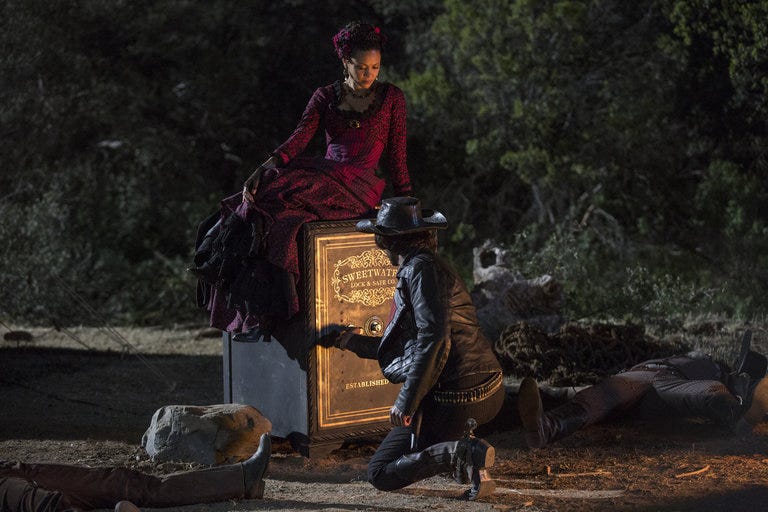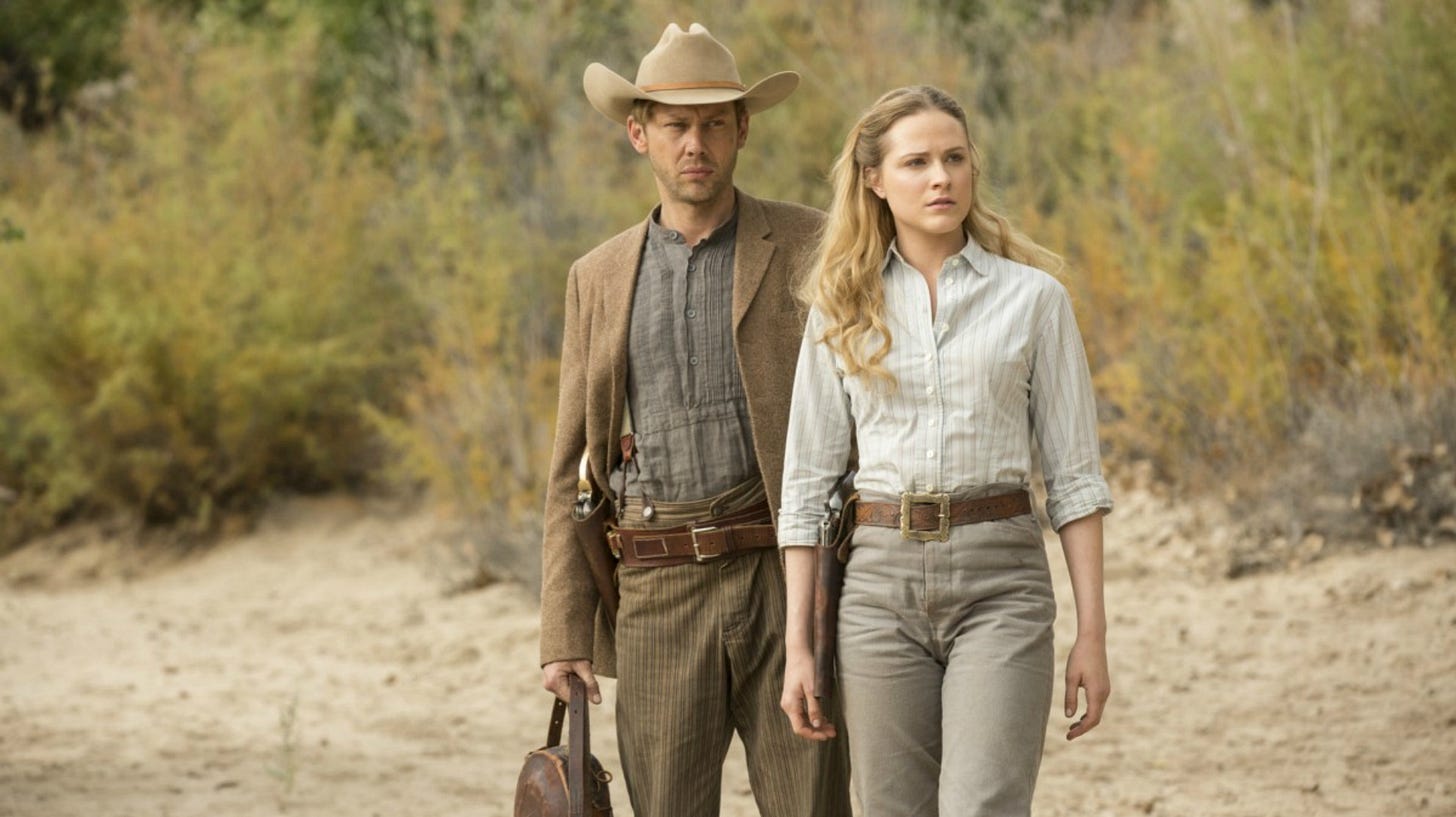Westworld Recap: What to Expect when You're Expecting
Westworld Season 1, Ep 9 | Aired Nov 27
With the creative mights of some of the best known twist makers in Hollywood behind it, Westworld has immediately become a show that fans pour over in search of hints, easter eggs, and spoilers. With that in mind, we forgo our usual recap in favor of a consideration of the biggest twists each episode has to offer. Now entering... Analysis Mode.
The entertainment industry has long been preoccupied with the idea of genre. Even in a time when Netflix can offer you the Female Driven Sci-Fi Monster B-Movies best suited to your particular interests, the industry as a whole has clung to an understanding that there are two main kinds of story. The first is a drama. The second? Comedy/Musical.
The somewhat bizarre category of Comedy/Musical is a relic of an older time in Hollywood, but it has somehow clung on to our modern world in small ways. The Golden Globes, for example, give separate awards each year for movies from the Drama category and for movies from the Comedy or Musical category. And while the distinctions between the two seemingly independent types of entertainment are vast, and while the intricacies there are certainly worth exploring, the similarities are very interesting as well.
A joke works because, deep down, you kind of always knew how it was going to end. Be it a professional standup comedian or just a friend at a bar, when that right line comes around you suddenly can see the punch line a mile off. But we like it that way, don't we? There's a satisfaction to being in on it, even for just a little while. In fact, that feeling of confidence in one's own prediction is so strong that a joke can sometime seem bad if it doesn't end in a predictable way.
Musical theater is successful for many of the same reasons. Music cues drive the plot of the story. They signal the arrival of certain themes, characters, or signature moments. Imagine the disappointment that would ensue if a revival of Phantom of the Opera ever deigned to allow the Phantom to enter without Andrew Lloyd Webber's iconic organ chords blaring throughout the theater. The music of a show invites us to know what is happening, even if the narrative wouldn't give quite as much away on its own.

Predictability is less... predictable in drama. A sprinkling of it throughout can be delightful. Add too much though and a film can be ruined from the first act. There's certainly no mystery about how well the dinosaur cages are going to work in Jurassic Park, but the suspense that leads up to the inevitable drives the film as much as - if not more than - the ensuing mayhem. On the other side of the predictability spectrum, when Kevin Spacey walks out of the police station at the end of The Usual Suspects or Bruce Willis is really dead the whole time, it's a sudden right hand turn that nobody signaled for. And it's wonderful.
Simply put, it seems that by this time next week even the most extreme Westworld theorizer may get their wish. Since Episode 2, the show has done little to dispel any of the theories that fans have thrown around the internet. If anything, each episode just seems to provide more evidence to why these theories must be correct.
The Nolans (and Abrams for that matter) have earned their keep in Hollywood by making some of the most surprising pieces of entertainment in the last 15 years. And, by and large, it has worked in the movies. Whether or not they have produced the best versions of the "big twist movie", they have certainly been quintessential in ushering it into the mainstream of modern entertainment. The approach even worked on television when taken to the most extreme degree possible by Abrams on LOST for ABC.
But alas, Westworld is not LOST. There is little on television today, or probably ever again, that can get away with everything that show got away with. A big part of that is because, towards the end of the show's run, LOST fans felt betrayed by the lack of closure they were given on all the questions they still had. Another big reason though is because of the very way of watching TV that LOST created.

Early on in the show's run, LOST's writers probably never imagined they'd have to explain why there was a polar bear on the island. They'd just put one there, people would think about it for a couple of minutes, then they'd move on to the next scene. But LOST permanently changed the way people watch TV - especially hour-long dramas. No stone is left unturned in the analysis process. Every name will be anagrammed, every background sign will be read. If there are clues you can bet your bottom dollar intrepid television audiences will find them. And unlike a movie, where even the most eagle-eyed viewer may get a couple of seconds here and there to take in clues about the ending of the puzzle they've been working on for two and a half hours, DVR wielding TV fans can pour over each of 10 hour long episodes as many times as they want, and walk away with something new each time.
Simply put, it seems that by this time next week even the most extreme Westworld theorizer may get their wish. Since Episode 2, the show has done little to dispel any of the theories that fans have thrown around the internet. If anything, each episode just seems to provide more evidence to why these theories must be correct. And while theorizing is fun and solving mysteries can help audiences feel in on the joke, so to speak, that experience seems somewhat cheapened when any Redditor with an HBO Go login could predict how the season would end two months ago. At that point is anyone even "solving" anything, or is everyone just following along with the show's plot?
Westworld is a show about entertainment. The nature of the plot means that the storytellers and, by extension, the characters are preoccupied with the nature of entertainment in the world and how it is supposed to function in society. The show also takes place in a world where the characters keep things close the chest, providing an air of mystery. But that artifical, in-show mystery seems to have been used to eliminate the need for any mystery for the audience.
Next week is the season finale of HBO's air-aparent to Game of Thrones, and there seems to be little reason to tune back in besides hearing Anthony Hopkins and Ed Harris confirm everything we're pretty sure we already know. Then again, maybe the Nolans and Abrams have more up their sleeves than we give them credit for. If this show has taught us anything, it's to be suspcisious when something seems like it's going to be nothing much.

